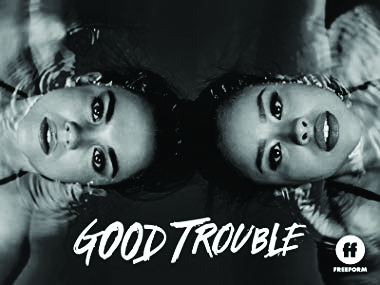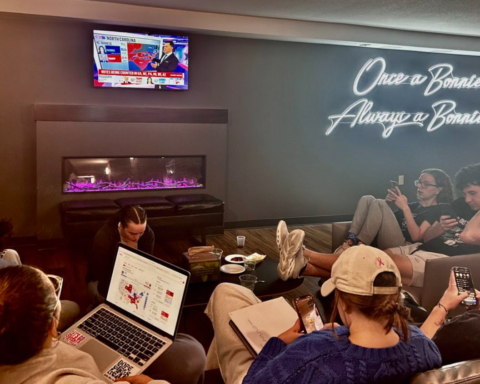Television shows give a reality escape to their viewers, especially those who worked a full day at the office. Many people sit on their couches after a long day, searching for a show to ease the stresses and burdens that the outside world provides. However, if the newly acclaimed couch potato happens to settle for Freeform’s “Good Trouble” after surfing the web, their flee from reality will be short lived as the series dives into the realm of modern adulting and societal struggles.
The spin-off of “The Fosters” follows the lives of Callie, played by Maia Mitchell, and Mariana, played by Cierra Ramirez, into adulthood. The sisters leave their San Diego hometown to move into a communal loft in downtown Los Angeles where they start their adult jobs and, well, all the adult problems that come with it.
Callie begins her adult experience with a clerkship for a well-known, conservative judge where she is thrown into a hard-hitting Black Lives Matter case about a young boy who was shot and killed by police officers. This case means a lot to Callie’s friend, Malika, played by Zuri Adele, because she is close to the young man’s family and when Malika realizes that Callie works with the judge on the case, she wants Callie to persuade the judge to rule on the boy’s behalf. This builds obvious tension between the two characters, because if the judge rules in favor of the officers, Malika would confront Callie about her lack of liberal influence on the judge.
Through all of this, it is clear that Callie has conflicting ideas about if she even wants to be a lawyer. Almost every episode includes at least one snippet of Callie complaining about the grueling hours that she must work and the endless amount of duties that her job requires. During a heated argument with boy-toy Gael, played by Tommy Martinez, they do discuss if being a lawyer is her passion anymore. However, later in the episode, Callie confirms that being a lawyer is her top priority and her eagerness for becoming a legal practitioner has not deflated.
Going through career doubts is something many people do. It can be hard to fully understand if the career path someone chooses is the right one for them. It’s normal. The only thing not normal is Mariana’s job experience.
Mariana starts her adult career path with a technology startup company, but instead of programming new software, she spends her day fighting off discrimination on multiple levels. Whether it’s her sexist boss who won’t let her work on group projects or how the company tries to perceive itself as a diverse community when there is only a handful of non-Caucasian minorities, the only thing keeping Mariana from quitting is the paycheck.
Mariana’s boss, Alex, played by Dustin Ingram, mistreats her in a myriad of ways. He talks down to her like she is a child, purposely mispronounces her name, dismisses her ideas (or sometimes steals them) and humiliates her in front of the entire company. He ruins the work experience for Mariana because of his negative attitude toward her, but she still manages to persevere every day. Mariana’s circumstance shows how women are still treated unfairly compared to men in the workforce.
Throughout one of the work days, Mariana, who is Latina, is asked to be photographed and interviewed for the company brochure to show the inclusion of diversity at their company. Mariana struggles to do the interview because she will have to lie and say that the company is very diverse and is inclusive of all ethnicities and genders which, of course, is far from the truth. But, if she doesn’t lie, she could get fired. In the end, Mariana decides to lie in sake of keeping her job.
Mariana’s experience resembles what people will sacrifice for their livelihoods, and in her case, it is lying to future workers about the company’s environment. It also shows what companies will do for their reputation, like firing workers when they say things that others might not like.
This American drama series sheds light on topics that other shows are afraid to discuss but many people go through. Whether it be discrimination, police brutality, female empowerment, sexism or workplace struggles, many people find themselves stuck in the middle of these real-world situations.
Some people say they don’t like the show’s liberal or democratic outlook or how it pushes political issues onto its viewers because some people watch TV to get away from reality, but this show puts them back into society’s grasp. However, “Good Trouble” sets a good example of how shows should make people uncomfortable and makes its audience question society’s standards. Unlike other shows that sugarcoat problems, this series uncovers the truth of the positives and negatives of the world that we live in today.
By Cammie Dutchess, Staff Writer
jonesdca17@bonaventure.edu






